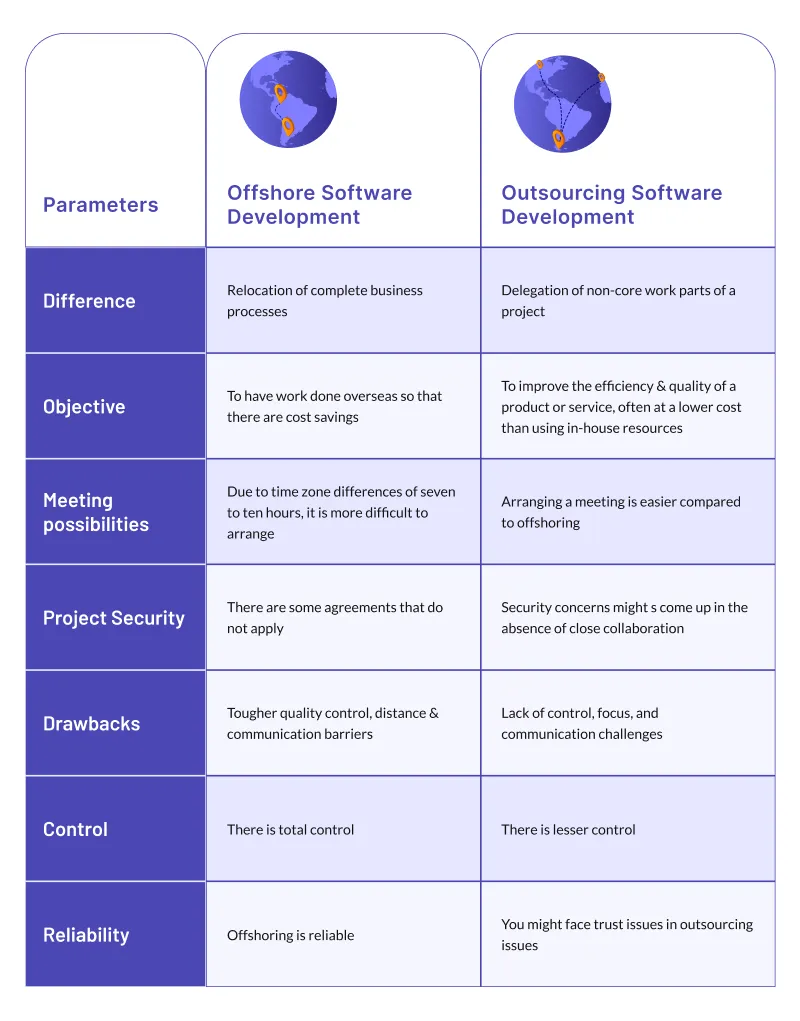Offshoring and outsourcing are similar business strategies that involve one party hiring another to take care of specific business processes that the company cannot do, like manufacturing and design. The biggest difference between offshoring and outsourcing is that offshoring refers to an international process, while outsourcing occurs within the same country.
For example, if company A hires company B to create a website in the United States, company A has outsourced this work to company B, while if company C is based in India, hires company D in Singapore to do the same work, then company C has offshored this work.
This post will discuss the pros & cons of both outsourcing vs. offshoring your business, so you can decide which is best for your business.
What is Offshoring?
Offshoring, also known as offshoring trade or outsourcing, transfers portions of a business process to another country with lower costs. It occurs when a company moves its operations to another country. Offshoring can be partial or complete.
Partial offshoring includes such practices as shipping goods from one country to another for final production and then sending the finished goods back to their home market. Complete offshoring refers to shifting all production tasks overseas, including research and development.
It was first used in the 1980s by IBM, which sent software jobs to India’s HCL Corporation. Offshoring has become more popular today as technological advances have made it easier for companies to do so.
Also Read: Staff Augmentation Vs. Project Outsourcing Vs. Managed Services: Which One Is Right For You
What is Outsourcing?
Outsourcing is shifting work to a third party, like an Offshore IT Company in India, who will carry out the work. Outsourcing allows businesses to focus on their core business and eliminates redundancies. For example, if a company outsources its payroll function to an offshore company in India, it could pay for the service once instead of paying salaries.
Businesses outsource to save money and eliminate redundancies. There are many advantages to outsourcing, but there are also disadvantages as well. Many companies need more time or resources, so they need to allocate funds to hire additional staff or personnel outside the company, which can be expensive. We can talk about that in more detail.
Learn the distinctions to streamline your development processes effectively.
Understanding the Differences between Offshoring and Outsourcing
According to Statista the global information technology (IT) spending on devices, including PCs, tablets, mobile phones, printers, as well as data center systems, enterprise software, and communications services came to 4.7 trillion U.S. dollars in 2023 and is expected to increase to around 5.1 trillion dollars in 2024.
When comparing Offshoring Vs. Outsourcing, we can see that the best option will depend on the needs of your business and how you want to approach this process.
However, offshoring companies are more likely to offer a higher level of expertise than outsourcing companies, while the latter may provide faster and less expensive services. Let’s look at the detailed comparison:
| Parameters | Offshore Software Development | Outsourcing Software Development |
| Differences | Relocation of complete business processes. | Delegation of non-core work parts of a project. |
| Objective | To have work done overseas so that there are cost savings. | To improve the efficiency & quality of a product or service, often at a lower cost than using in-house resources |
| Meeting Possibilities | Due to time zone differences of seven to ten hours, it is more difficult to arrange | Arranging a meeting is easier compared to offshoring. |
| Project Security | There are some agreements that do not apply. | Security concerns might s come up in the absence of close collaboration. |
| Control | Higher Control | Lesser Control |
| Drawbacks | Tougher quality control, distance & communication barriers. | Lack of control, focus, and communication challenges. |
| Reliability | Offshoring is reliable. | You might face trust issues in outsourcing issues. |
Pros and Cons of Offshoring and Outsourcing Software Development
Many Software Development Companies offer both services; however, it is up to you and your requirements which service would be ideal for you. To understand this better, below are the pros and cons of outsourcing & offshoring software development services.
Pro’s
Although outsourcing might be different from offshoring, both services have specific advantages that make companies choose them; let’s look.
| Sr. No | Offshore Software Development | Outsourcing Software Development |
| 1 | Businesses can hire offshore developers at reasonable rates. | Outsourcing software development is cost-efficient. |
| 2 | It offers easier & smoother communication. | Companies can leverage specialized skills. |
| 3 | Offers higher productivity, greater efficiency, and valuable insights from other cultures and countries. | Flexible work hours can boos productivity. |
| 4 | Working with an offshore could increase flexibility since their hours may differ from yours. | It’s quicker and more valuable when facing a time crunch. |
Cons
| Sr. No | Offshore Software Development | Outsourcing Software Development |
| 1 | Cultural and social differences lead to communication challenges. | Cultural and social differences lead to communication challenges. . |
| 2 | There will always be data transfer issues even when there is shared space collaboration. | Despite strong Data Protection Acts, outsourcing software development has various security concerns. |
| 3 | Less quality control | Less management control. |
| 4 | Technology in the country of offshoring may be less reliable than in the country of origin. | Costs more than an in house team |
Importance of Offshore Software Development
The reasons offshoring is essential are numerous; some of them are:
1. It can save labor costs by hiring cheaper workers abroad.
2. It will take less time to complete a project since your overseas developers have 24/7 access to the project they’re working on. They’re usually able to work on them during their time zone rather than waiting for you to be available.
3. You’ll have access to highly qualified workers with skill sets that you may need for a particular project but don’t have locally.
4. Between Offshore vs. Outsourcing, offshoring is always better because it gives you access to resources in other countries with no negative impacts of outsourcing. One major difference between outsourcing and offshoring is where your staff works.
Also Read: Offshore Resource Hiring-E-Guide
Reasons Why Companies Outsource
There are several reasons companies prefer outsourcing, such as:
- To reduce costs. It is more affordable for a company to outsource its software development needs than to do it in-house.
- The company might need more software development expertise for the project’s specific requirements.
- Outsourcing is convenient for companies with no dedicated software development department, so they outsource their projects to offshoring vendors.
- Companies might use outsourcing as market research. You can do this if you are looking for different opinions from an outside source on your product or website before
- launching it.
Reasons Why Companies Offshore
There are many reasons companies go for offshore software development services:
- Due to the low cost of hiring developers in the country, companies opt for offshore.
- Third-world countries could lack qualified professionals in a company’s very own country.
- Offshore teams often have much more experience in specific technologies than those from average developed countries like US or Canada, so they may be able to finish
- projects much faster than teams from developed countries with less experienced developers on board.
- Offshoring can provide peace of mind due to geographical distance. If anything goes wrong, it won’t affect the company as badly as if there was no separation between them
- and their outsourced team.
Lastly, top offshore software development services companies offer detailed pricing policies. You don’t have to worry about paying extra fees after your initial contract expires or being forced into unnecessary upgrades at every turn.
Business Processing Outsourcing (BPO)
BPO or Business Processing Outsourcing is when a company outsources the operation of its business processes to a third party. Unlike offshoring, BPO works with the customer’s internal staff rather than transferring employees.
Hiring a Top Offshore Software Development Services Company can offer many benefits, such as lower costs and faster implementation times. Whether you are considering offshoring or BPO, it is important to research beforehand to find out which option best fits your needs.
Let ValueCoders handle your IT needs while you concentrate on scaling your business.
Choosing the Best Option
Well, that is not an easy question to answer because both services have advantages and disadvantages. For example, if you are looking for a software development company in India, you can go with the offshore IT company in India.
But if your company needs a solution such as software development outsourcing services from Top Offshore Software Development Services Company, then it might be better to outsource the project.
Hence it depends on the business requirements. In short, they both have their own set of benefits and shortcomings. Which one should we choose? The answer is: It all depends on what is more important to you!
What Are Your Requirements For An Outsourcing Company?
Offshore vs. outsourcing requires much research when deciding which option to go with. Each outsourcing company has specific requirements for its prospective clients. Let’s look into the following:
1. If you need cost-effective solutions, focus on Indian companies, as they are known to provide reasonable rates.
2. If you want to hire somebody who can understand your business culture, ensure that the provider is from your home country.
3. Always get references from other provider customers before making any commitments.
4. It is essential to determine how much time it will take to complete a task before deciding which provider to work with.
5. It is also crucial to determine if any guarantees are in place in case anything goes wrong with the project.
Questions may help you determine whether an outsourced company would suit your needs:
- What does it mean to outsource?
- What does it mean when something gets offshored?
- Do I need an offshore development team?
Also Read: Offshore Vs Nearshore Outsourcing: A Detailed Comparision
Conclusion
Offshoring is when a company sends work to another company in a different country. It’s typically used by companies who want to stay competitive in the global marketplace but do not want to relocate their operations. Outsourcing is when a company contracts with another organization or individual to provide a service or product.
When comparing Offshore vs Outsourcing, choosing one of these depends on what you’re looking for. Outsourcing may be your better choice if your business needs a single job. But offshoring might be more advantageous if you look for a long-term relationship that will grow as your business grows.











